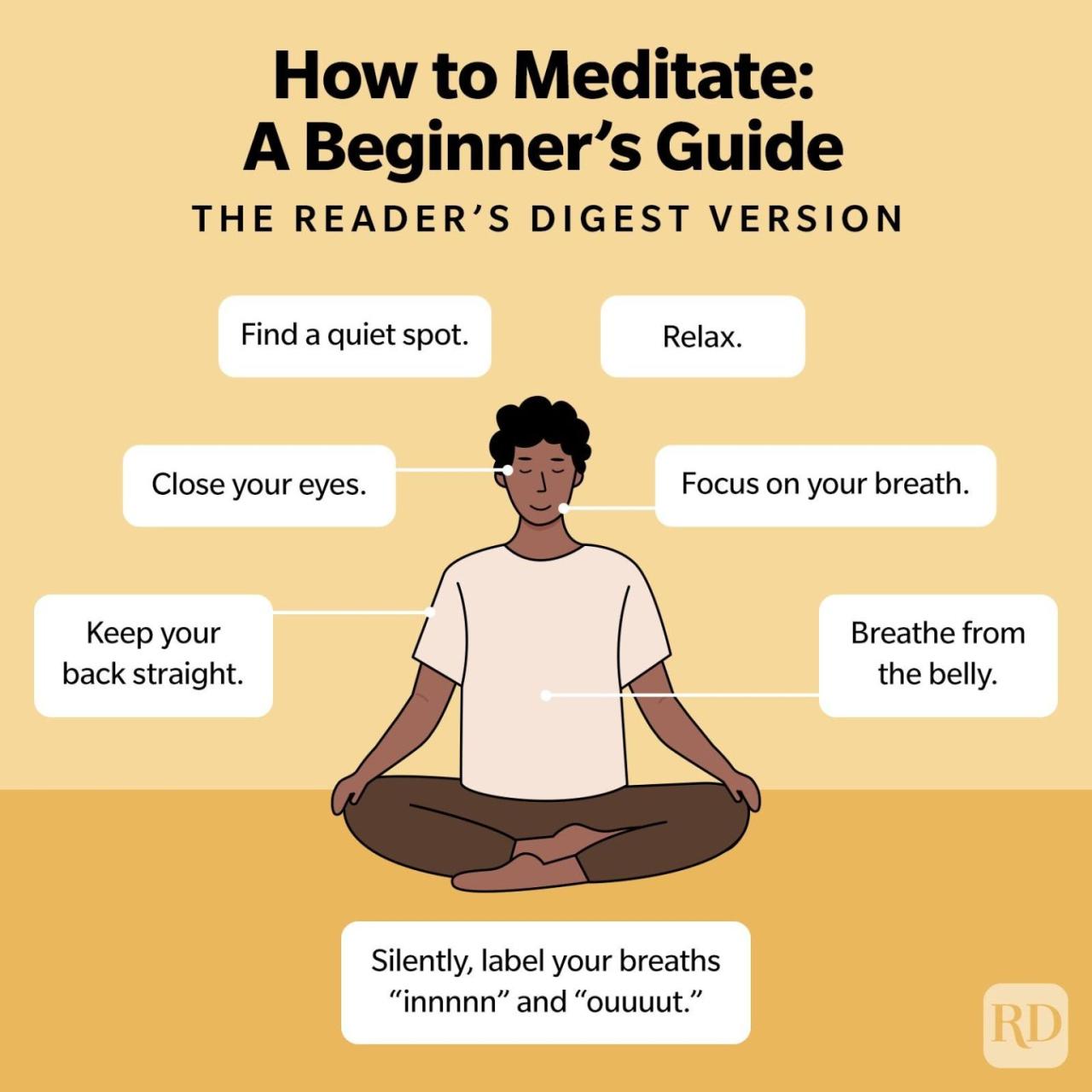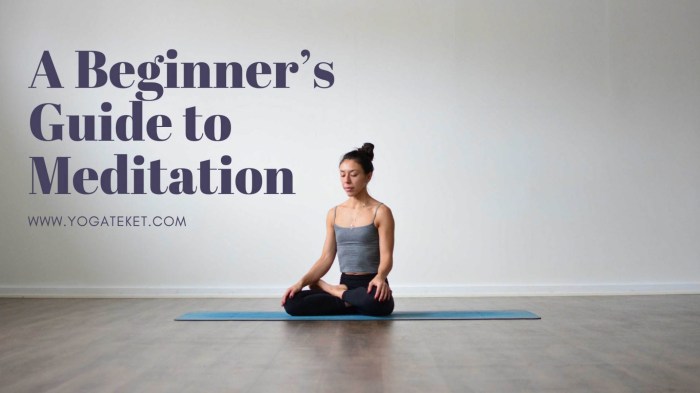Meditation for Beginners dives into the world of mindfulness with a cool and engaging twist, bringing you the essential tips and techniques to kickstart your practice. Get ready to zen out!
Whether you’re a newbie looking to calm your mind or just curious about the art of meditation, this guide has got you covered with everything you need to know to begin your journey to inner peace.
Introduction to Meditation
Meditation is a practice that involves focusing your mind on a particular object, thought, or activity to achieve mental clarity and emotional calmness. For beginners, meditation can be a powerful tool to reduce stress, improve concentration, and promote overall well-being.
The Importance of Starting a Meditation Practice
Starting a meditation practice is crucial for beginners as it can help cultivate mindfulness, increase self-awareness, and enhance emotional resilience. By incorporating meditation into your daily routine, you can develop a greater sense of inner peace and balance amidst the chaos of everyday life.
Different Types of Meditation Suitable for Beginners
- Mindfulness Meditation: Focuses on being present in the moment and observing thoughts and sensations without judgment.
- Guided Meditation: Involves following the instructions of a teacher or audio recording to help you relax and focus your mind.
- Mantra Meditation: Involves repeating a word or phrase to help quiet the mind and enhance concentration.
- Body Scan Meditation: Involves systematically focusing on different parts of the body to release tension and promote relaxation.
Setting Up a Meditation Space: Meditation For Beginners
Creating a peaceful meditation environment at home is essential for a successful practice. Your meditation space should be a place where you feel calm, relaxed, and free from distractions.
Choosing the Right Location
When selecting a location for your meditation space, consider a quiet area in your home where you can sit comfortably without interruptions. Choose a spot with natural light if possible, as it can help create a serene atmosphere.
- Avoid high-traffic areas to minimize distractions.
- Consider using a corner of a room or a designated area to set up your meditation space.
- Make sure the area is clean and clutter-free to promote a sense of peace and tranquility.
Essential Items for Enhancing the Experience
To enhance your meditation experience, consider adding the following items to your meditation space:
- A comfortable cushion or meditation mat to sit on.
- Candles, incense, or essential oils for creating a soothing ambiance.
- A blanket or shawl to keep you warm during meditation.
- Plants or natural elements to bring a sense of nature indoors.
Basic Meditation Techniques
When starting out with meditation, it’s essential to begin with basic techniques to build a strong foundation for your practice.
Simple Breathing Techniques
One of the most fundamental meditation techniques is focusing on your breath. Find a quiet place to sit or lie down comfortably. Close your eyes and take slow, deep breaths. Pay attention to the sensation of the air entering and leaving your body. If your mind starts to wander, gently bring your focus back to your breath.
Mindfulness Practice
Mindfulness involves being fully present in the moment without judgment. To practice mindfulness, bring your awareness to your current thoughts, feelings, and sensations. Observe them without getting caught up in them. This can help you develop a sense of calm and clarity.
Focusing Techniques
Body scans and visualization are effective focusing techniques for meditation. During a body scan, start from the top of your head and slowly move down, paying attention to each part of your body. Visualization involves picturing a peaceful scene or a positive outcome in your mind. Both methods can help you stay present and centered during your practice.
Overcoming Common Challenges

When starting out with meditation, beginners often face common obstacles that can hinder their progress. These challenges can include distractions, restlessness, and discomfort during meditation sessions. It’s important to address these issues in order to fully experience the benefits of meditation practice.
Dealing with Distractions
- Acknowledge the distraction without judgment and gently bring your focus back to your breath or mantra.
- Try using a guided meditation to help keep your mind centered and less prone to wandering.
- Experiment with different meditation techniques to find one that works best for you and minimizes distractions.
Handling Restlessness or Discomfort
- Practice deep breathing exercises to help calm your mind and body when restlessness arises.
- Adjust your posture or find a comfortable position that alleviates any physical discomfort during meditation.
- Remind yourself that restlessness and discomfort are normal parts of the meditation process and try to observe them without attachment.
Establishing a Consistent Practice

Consistency is key when it comes to meditation. Setting realistic goals and staying motivated are essential for beginners to establish a regular meditation practice.
Setting Realistic Meditation Goals
- Start small: Begin with just a few minutes of meditation each day and gradually increase the duration as you become more comfortable.
- Be consistent: Aim to meditate at the same time each day to create a routine that becomes a habit.
- Focus on process, not outcome: Instead of setting goals based on achieving a certain state of mind, focus on the act of meditating itself.
- Track your progress: Keep a meditation journal to monitor your practice and celebrate small milestones along the way.
Maintaining Motivation in a Meditation Routine
- Find your “why”: Reflect on the reasons why you want to meditate and remind yourself of these motivations regularly.
- Mix it up: Explore different meditation techniques to keep your practice fresh and prevent boredom.
- Join a community: Connect with other meditators, either in person or online, to stay inspired and accountable.
- Reward yourself: Celebrate your commitment to meditation with small rewards or treats to reinforce positive behavior.
Benefits of Consistency in a Meditation Practice, Meditation for Beginners
- Improved focus and concentration
- Reduced stress and anxiety levels
- Enhanced self-awareness and emotional regulation
- Increased feelings of calm and inner peace
Resources and Tools for Beginners
When starting out on your meditation journey, it’s helpful to have access to resources and tools that can guide you along the way. Here are some recommendations to get you started:
Meditation Apps and Online Platforms
- Headspace: A popular app that offers guided meditation sessions for beginners.
- Calm: Another app with a variety of meditation programs and relaxation techniques.
- Insight Timer: An app that provides a wide range of guided meditations and a supportive community.
- Mindful.org: A website that offers articles, videos, and resources on mindfulness and meditation.
Books and Websites for Guidance
- “The Power of Now” by Eckhart Tolle: A timeless book that explores the importance of living in the present moment.
- “Real Happiness” by Sharon Salzberg: A practical guide to meditation for beginners.
- Yoga Journal: A website with articles and tutorials on meditation and mindfulness practices.
Guided Meditation Sessions and Classes
- Local yoga studios or meditation centers often offer beginner-friendly classes and workshops.
- Online platforms like Mindful Schools or InsightLA provide virtual guided meditation sessions for beginners.
- Community centers or wellness retreats may host meditation events or workshops that are open to beginners.






